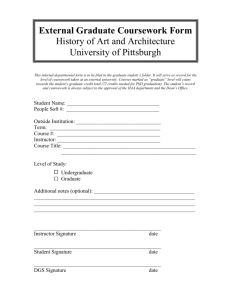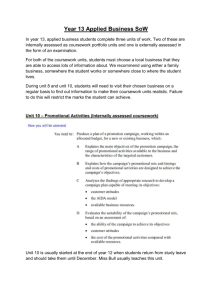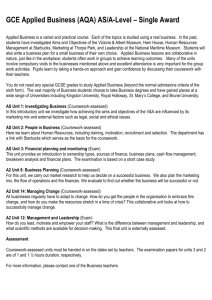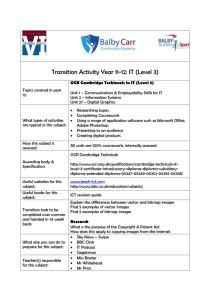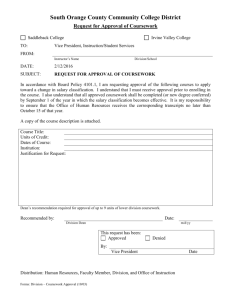Management Science and Operations
advertisement
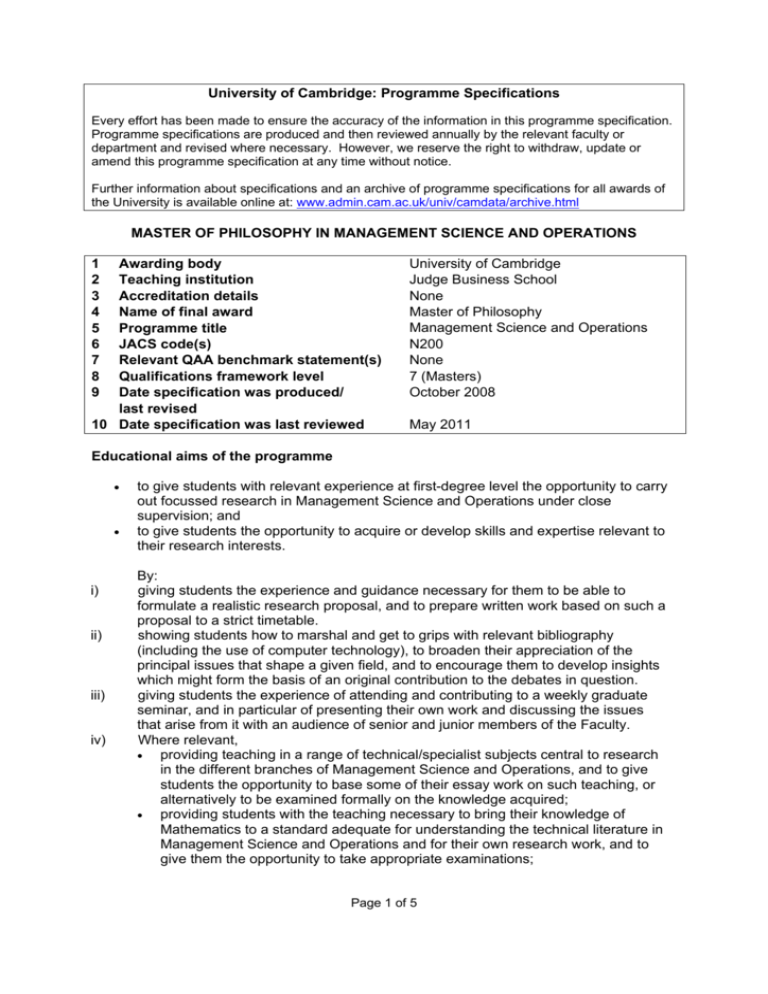
University of Cambridge: Programme Specifications Every effort has been made to ensure the accuracy of the information in this programme specification. Programme specifications are produced and then reviewed annually by the relevant faculty or department and revised where necessary. However, we reserve the right to withdraw, update or amend this programme specification at any time without notice. Further information about specifications and an archive of programme specifications for all awards of the University is available online at: www.admin.cam.ac.uk/univ/camdata/archive.html MASTER OF PHILOSOPHY IN MANAGEMENT SCIENCE AND OPERATIONS 1 2 3 4 5 6 7 8 9 Awarding body Teaching institution Accreditation details Name of final award Programme title JACS code(s) Relevant QAA benchmark statement(s) Qualifications framework level Date specification was produced/ last revised 10 Date specification was last reviewed University of Cambridge Judge Business School None Master of Philosophy Management Science and Operations N200 None 7 (Masters) October 2008 May 2011 Educational aims of the programme • • i) ii) iii) iv) to give students with relevant experience at first-degree level the opportunity to carry out focussed research in Management Science and Operations under close supervision; and to give students the opportunity to acquire or develop skills and expertise relevant to their research interests. By: giving students the experience and guidance necessary for them to be able to formulate a realistic research proposal, and to prepare written work based on such a proposal to a strict timetable. showing students how to marshal and get to grips with relevant bibliography (including the use of computer technology), to broaden their appreciation of the principal issues that shape a given field, and to encourage them to develop insights which might form the basis of an original contribution to the debates in question. giving students the experience of attending and contributing to a weekly graduate seminar, and in particular of presenting their own work and discussing the issues that arise from it with an audience of senior and junior members of the Faculty. Where relevant, • providing teaching in a range of technical/specialist subjects central to research in the different branches of Management Science and Operations, and to give students the opportunity to base some of their essay work on such teaching, or alternatively to be examined formally on the knowledge acquired; • providing students with the teaching necessary to bring their knowledge of Mathematics to a standard adequate for understanding the technical literature in Management Science and Operations and for their own research work, and to give them the opportunity to take appropriate examinations; Page 1 of 5 • providing students with the teaching necessary to bring their knowledge of Management as an academic discipline to a standard adequate for research in Management Science and Operations, and to give them the opportunity to take appropriate examinations; The primary focus will normally be on one of the following research areas, which are the subject areas around which teaching and research in Management Science and Operations at the Judge Business School is organised: (A) Operations Strategy (B) Supply and Value Chain Management (C) New Product Development and Innovation (D) Revenue Management (E) Energy and the Environment (F) Health Care Management (G) Theory and Applications of Mathematical Modelling Programme outcomes Knowledge and Understanding By the end of the course students should have: 1 2 developed a deep knowledge of their chosen area of Management Science and Operations and of the academic debates within it; a conceptual understanding that enables the evaluation of current research and methodologies; Teaching and Learning (1) and (2) are developed through: • lecture courses; • personal study; • opportunity for participation in research culture, e.g. research seminars; • one-to-one supervisions. Assessment (1) and (2) are assessed though examination, coursework and a thesis. Skills and other attributes By the end of the course students should have: 3 4 5 acquired or consolidated modelling, computational and mathematical skills appropriate for research in their chosen area. demonstrated independent judgement, based on their own research; presented their own ideas in a public forum and learned to contribute constructively within an international environment. Teaching and Learning (3) these skills are developed through; • specialist subject classes; • coursework • one-to-one supervisions. Page 2 of 5 (4) is developed through personal study and individual supervision for the thesis and essays; (5) is developed through preparation for and feedback from presentation of papers in seminars Assessment (3) is assessed by examination and coursework (4) is assessed by thesis and coursework Programme structure Submit Thesis March Submit Coursework Marked and feedback given Submit Coursework Marked and feedback given Entry First Class degree or equivalent required in a subject that provides adequate quantitative training January Assessed Seminar presentations June October Degree awarded Requirements for the award of the degree (i) The examination is divided into two parts: • six module assessments, either as unseen written exam of through coursework, each of which may be either an essay of not more than 4,000 words or an equivalent exercise or exercises • a dissertation of not more than 12,000 words in length A fail mark on a part of the examination would not necessarily mean overall failure in the examination, provided that the examiners judged it to be outweighed by the remainder of the student’s performance. (ii) No aggregate numerical mark for the entire M.Phil. is awarded. (iii) The overall result in the M.Phil. is either a Pass, a Fail or a distinction. For marking criteria see http://wwwintranet.jbs.cam.ac.uk/students/mphils/downloads/handbook_mphilmgtsci.pdf (local access only) Indicators of quality Page 3 of 5 The Management Science and Operations faculty holds editorial positions in the major international journals, including Operations Research, Mathematics of Operations Research, and Editor-in-Chief of Mathematical Programming, Series B. Learning Support All students are members of a College as well as the Faculty and have access to learning support from both College and University. Each student has an overall supervisor who gives advice on planning the year’s work. Individual specialists may also help with preparation for essays. Progress is monitored through the assessed coursework on which the Degree Committee via the Academic Secretary will give feedback. The Faculty’s Academic Secretary and the programme director can also offer advice. The College Tutor for Graduates will also play a role in induction, support and guidance. An M Phil Handbook is available, as well as an unofficial guide produced by students themselves. The Faculty’s learning resources include a library which constitutes the main working collection for M Phil students and a computer facility for graduate students. See also: http://www.jbs.cam.ac.uk/ Evaluating and improving the quality and standards of learning The Faculty participates in the of the University’s quality assurance and enhancement system: 1 2 3 External Examining: the M Phil in Management Science and Operations has an external examiner who submits a report which is considered by the Degree Committee (responsible for graduate matters) and Faculty Board. Action in response to reports includes, where appropriate, revisions or adjustments to the programme and its delivery. The M Phil was the subject of internal Faculty reviews in 2003/04, and 2008. Course approval: the Faculty is required to obtain the approval of the Board of Graduate Studies and the General Board’s Education Committee before any significant changes to courses are made: Genera Board Internal Review: all the Faculty’s teaching activities, including the M Phil were reviewed by the University’s General Board in 2008. Following established departmental procedures, student feedback will be gathered, through questionnaires and termly meetings, for each part of the course, including facilities such as administration, library and IT. Course teachers, etc. are asked to comment in writing on the feedback and address any concerns. This feedback and the staff response are routinely discussed by the graduate teaching committee, which has student representatives. Corrective action can then be implemented quickly. One MPhil in Management Science student represents the interests of the students on the Faculty’s Graduate Teaching Committee. Employment and careers Preparation for employment is provided in the opportunities for acquisition of relevant skills outlined in Section 11. See the University policy of employment skills (http://www.admin.cam.ac.uk/offices/education/learning/employers.html) Most M Phil graduates carry on to read for a Ph D. In Cambridge continuation is dependent on average First Class marks and a First Class thesis. Page 4 of 5 General information See also: GRADUATE STUDIES IN MANAGEMENT AT CAMBRIDGE: http://www.jbs.cam.ac.uk/programmes/index.html Page 5 of 5
